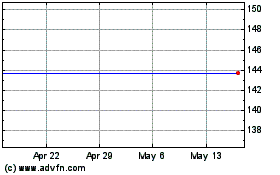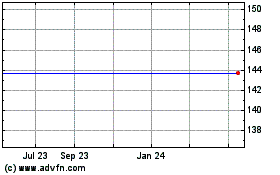By Jennifer Maloney and Saabira Chaudhuri
This article is being republished as part of our daily
reproduction of WSJ.com articles that also appeared in the U.S.
print edition of The Wall Street Journal (August 21, 2018).
PepsiCo Inc. has agreed to buy one of its fiercest critics,
seltzer-machine maker SodaStream International Ltd., for $3.2
billion, the latest move by the beverage-and-food giant to broaden
its offerings beyond sugary sodas and salty snacks.
Israel-based SodaStream makes countertop machines that allow
consumers to carbonate tap water at home by filling a reusable
bottle and adding flavors if desired. As consumers have shifted
from sugary soft drinks to bottled water, the Nasdaq-listed company
has pivoted to promote itself as a maker of homemade seltzer rather
than a maker of homemade soda.
The deal creates somewhat of an awkward pairing. SodaStream has
singled out PepsiCo and other beverage companies in public
statements and advertising campaigns criticizing bottled-water
makers for polluting the environment.
"Shame on PepsiCo," SodaStream Chief Executive Daniel Birnbaum
said last year when the soda giant launched its premium
bottled-water brand LIFEWTR. "I'll say it till I'm blue in the
face: The bottled-water industry is the biggest marketing scam of
all time."
A SodaStream spokeswoman on Monday referred questions to
PepsiCo.
In an interview, PepsiCo finance chief Hugh Johnston said:
"SodaStream's point of view is that they want a healthier, more
sustainable planet," a goal the soda giant shares. He added, "There
was a good cultural match here in terms of the values."
In discussions between the two companies over the past several
years, "we got more comfortable that, in fact, we think about
things in the same way," Mr. Johnston said.
PepsiCo has been under pressure this year to restructure its
North America beverage business amid weak sales of its core brands
Pepsi-Cola, Mountain Dew and Gatorade.
The sales slump came after the company last year shifted too
much shelf space and advertising money to new, healthier products
including LIFEWTR.
Shares in PepsiCo rose after the announcement but later fell,
closing 12 cents down at $114.84. SodaStream's shares rose 9.4% to
$142.111 in New York.
Wells Fargo analyst Bonnie Herzog offered a skeptical view of
the deal, saying it was questionable whether buying SodaStream
would do much to help PepsiCo's efforts to improve volumes in its
North American drinks business.
Mr. Johnston said the deal isn't a response to the company's
flagging North America beverage sales, but rather an opportunity to
expand SodaStream's sales around the world and to give PepsiCo
better reach into markets such as Germany and Japan, where
SodaStream is strong. It also gives PepsiCo entree into what Mr.
Johnston called "in-home beverage creation."
Under departing CEO Indra Nooyi, PepsiCo has expanded from its
cola roots into hummus, kombucha and other healthier products,
although results have been mixed. The company has set a target for
sales growth of nutritious products to outpace the rest of the
portfolio by 2025.
Incoming PepsiCo CEO Ramon Laguarta played a key role in the
SodaStream deal, two people familiar with the matter said.
Mr. Laguarta, who is currently PepsiCo's president, approached
Mr. Birnbaum about four weeks ago about doing a deal, one of the
people said. The pact came together quickly, with no other bidders
involved, both people familiar with the matter said.
PepsiCo had built a relationship with SodaStream under Ms.
Nooyi, selling its cola with SodaStream machines in 2015 as an
experiment in a few dozen stores across the U.S. PepsiCo had
previously approached SodaStream at least once in the past eight
years, people familiar with the matter said. Ms. Nooyi had expected
the company would help the soda giant pivot to the healthier and
more environmentally friendly offerings she envisioned.
In addition to LIFEWTR, PepsiCo sells the Aquafina water brand
in the U.S. and earlier this year launched a new brand of flavored
seltzer called Bubly.
Sparkling water has grown more quickly than the overall bottled
water category in the U.S., clocking volume growth of 38% last
year, according to data from industry tracker Beverage Marketing
Corp. That compares with 7% growth for the overall packaged-water
industry.
Consumers are turning to fizzy water as a replacement for sugary
soft drinks and diet sodas. Meanwhile, sales of bottled water -- a
much bigger category -- have slowed amid competition from sparkling
water, tea, coffee and other beverages.
The Israeli company has courted controversy in recent years
because its former location -- in the West Bank town of Ma'aleh
Adumim -- made it a target for campaigns urging consumers to dump
its products if the company remained in disputed territory.
SodaStream gave in to the political pressure and in 2015 moved
its headquarters to Tel Aviv and its manufacturing operations to
southern Israel.
The countertop carbonation-machine maker is widely accepted to
have invented the notion of make-it-at-home soda and has roots
going back to 1903, when it was founded in London by a gin
distiller.
In early years it was marketed to Britain's upper class, and was
reportedly a favorite of the royal household. But home carbonation
of tap water eventually took off and in the 1970s and 1980s the
company grew to reach 10 million U.K. homes, alongside a marketing
catch phrase: "Get Busy With the Fizzy."
A series of changes of ownership, which included Reckitt &
Coleman and Cadbury Schweppes, grounded momentum. Eventually the
company was bought by Soda-Club, its Israeli distributor. Then
private equity took a controlling interest, appointed Mr. Birnbaum
-- previously the Israel CEO of U.S.-based sports-apparel company
Nike Inc. -- as CEO, and listed the stock in 2010. SodaStream now
has 2,000 employees.
Earlier this month SodaStream reported its revenue had climbed
31% to $171.5 million for the quarter ended June 30, while its net
income rose 82%. The company described the quarter as its best to
date.
A backlash against single-use plastic has taken hold in some
countries in Western Europe, where SodaStream makes most of its
sales.
One SodaStream ad featuring "Game of Thrones" actors Hannah
Waddingham and Thor Bjornsson has captured 2.7 million views on
YouTube. It parodies a scene from the television series, with a
woman crying "Shame!" as she follows a man carrying bottled
sparkling water out of a grocery store.
As recently as this month, SodaStream had been planning a fall
campaign "against single-use plastic bottles and big beverage," a
company spokeswoman said in early August.
PepsiCo said Monday that buying SodaStream is one of several
ways in which the soda giant is reducing the use of plastic
bottles. Others include Drinkfinity, a kit that includes reusable
bottle and recyclable flavor pods, and Aquafina water stations,
which dispense water with or without flavors in offices and on
college campuses.
--Cara Lombardo contributed to this article.
Write to Jennifer Maloney at jennifer.maloney@wsj.com and
Saabira Chaudhuri at saabira.chaudhuri@wsj.com
(END) Dow Jones Newswires
August 21, 2018 02:47 ET (06:47 GMT)
Copyright (c) 2018 Dow Jones & Company, Inc.
Sodastream International Ltd. - Ordinary Shares (delisted) (NASDAQ:SODA)
Historical Stock Chart
From May 2024 to Jun 2024

Sodastream International Ltd. - Ordinary Shares (delisted) (NASDAQ:SODA)
Historical Stock Chart
From Jun 2023 to Jun 2024
